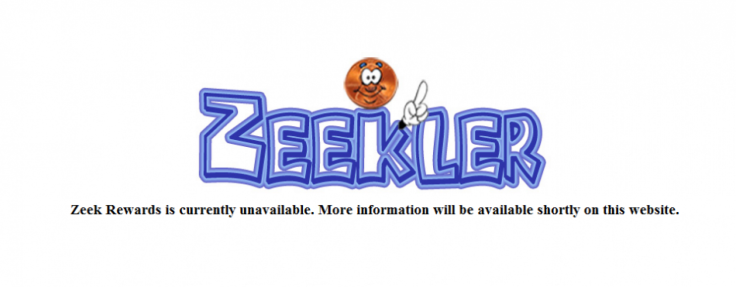Zeek Pyramid Scheme: A Million Penny Crimes Set Record For Number Of Victims

Only a few years ago, Bernie Madoff went into the history books of white-collar crime for running the biggest Ponzi scheme in history. Now Paul Burks, CEO of Rex Venture Group, looks to be joining him in the pages of infamy.
At $600 million, Burks' Zeekler and ZeekRewards scheme seems negligible compared to Madoff's $65 billion super-fraud. But Burk's operation, based in Lexington, N.C., directly affected more individuals -- more than a million cheated American and international investors, authorities say -- making it the larger pyramid by the sheer number of persons involved.
The entire Zeek operation has now been shut down on emergency orders from the U.S. District Court of North Carolina, in accordance with recommendations from the Securities and Exchange Commission. The SEC alleges that the Zeekler and ZeekRewards operations were close to catastrophe -- on "the verge of collapse" being the specific words used by the SEC's press release from Friday.
If the Zeekler/ZeekRewards fraud has demonstrated anything, it is that the power of the digital transaction, coupled with the idea of making an easy buck or getting quick savings in hard economic times, can create a powerful formula for abuse.
Stephen Cohen, an associate director of the SEC's enforcement division, stated to the press that "ZeekRewards misused the power of the Internet and lured investors by making them believe they were getting an opportunity to cash in on the next big thing. In reality, their cash was just going to the earlier investor."
A damning assessment to be sure, and one that makes Burks' past promises to investors sound like bold-faced lies. "We are making the changes that will assure long-term survival and viability. I am totally committed to each of you and to keeping everything 100 percent compliant and VERY profitable for you," said Burks in a letter to ZeekRewards participants about a year ago, Aug. 13, 2011.
Internet penny auctioning is no new "industry." Numerous other companies, many of questionable legitimacy, exist. Customers usually buy bid packages, essentially chips, in order to have the right to compete against others for real objects like gift cards, appliances, even cars. If you outbid your competitors, but stay under the original value of the prize, you've made what can arguably be called a smart purchase. Everyone else loses the money they used in the bidding. Internet bots, essentially programs designed to automatically place orders for an individual (or as some allege, simply to drive up costs), give the impression of streamlining and simplifying the entire process.
Burks' innovation was being the first to offer an investment option side to the business through his ZeekRewards site, starting in January 2011. The investment took the form of paying for large numbers of Zeekler.com bids. Those who signed became "affiliates" who had to complete a daily set of tasks, including soliciting newcomers (many of course, would go to family and friends). In return, they were offered daily "profit points," initially worth 1.5 percent of their investment (the company promoted itself by saying that 50 percent of all daily profits went to affiliates). Customers could either collect those points as cash or roll them over and accumulate them for larger future payoffs.
A Zeekler bidding package cost $32.50 for 50 bids, and ranged up to $260 for 400 bids. A regrettable loss, but certainly not crippling if ultimately wasted. But anonymous ZeekRewards investors noted that some individuals had as much as $10,000 to $20,000 in the company. That amount could be a life-shattering loss for any middle-income American family.
ZeekRewards has paid out some $375 million to investors and holds about $225 million in domestic and overseas banks. Investigators say the company had $162 million in revenue in July, mostly based on bringing in new customers. However, it was also paying out $160 million, a small margin for error. Had more investors simply chosen to receive cash payouts, the company would have been ruined even earlier.
Burks settled with the SEC by paying $4 million in civil penalties and relinquishing all interests and assets of the body of families under Rex Venture (including the Zeek sites), but has not admitted to nor denied the charges brought against him. The government will now oversee the immense task of distributing the appropriate funds to the affected parties, many of them located overseas. It is difficult to estimate how long that process will take, though it is thought to be a long and arduous one.
The SEC notes that "customers were offered several ways to earn money through the ZeekRewards program, two of which involved purchasing securities in the form of investment contracts. These securities offerings were not registered with the SEC as required under the federal securities laws."
The agency blasts ZeekRewards, asserting that it "fraudulently conveyed the false impression that the company was extremely profitable when, in fact, the payouts to investors bore no relation to the company's net profits. Most of ZeekRewards' total revenues and the 'net profits' paid to investors have been comprised of funds received from new investors in classic Ponzi scheme fashion."
But no matter how thorough or detailed the SEC findings, it fails to explain a fundamental and deeply troubling problem: Why were so many sold on the idea of Zeek's business model?
Perhaps the deeper problem is not how well the company hid its tenuous business model, but how readily customers were willing to ignore it in order to get the chance for a quick buck. In uncertain financial times, the timeless appeal of a get-rich-quick schemes may be even more seductive - all the more reason to trust in the virtues of skepticism and caution.
Note: those with inquiries about Zeek can reach the North Carolina Attorney General/ State Department of Justice at (919) 716-6046 or 1-877-5-NO-SCAM
Questions and concerns specially related to ZeekRewards are being received at zeek@ncdoj.gov
© Copyright IBTimes 2024. All rights reserved.



















